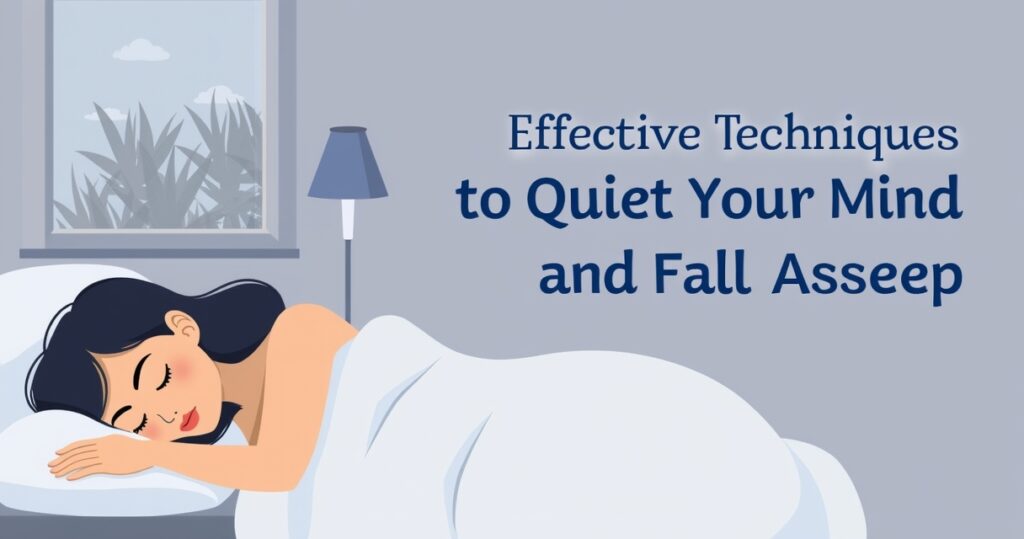In our fast-paced world, getting a good night’s sleep has become a rare luxury for many. Anxiety, stress, and constant stimulation can make it difficult to unwind and quiet your mind, even when you’re lying in bed. However, achieving restful sleep is essential for your physical and mental well-being. In this article, we’ll explore practical strategies to help you quiet your mind and improve your sleep quality.

Why Quieting Your Mind Is Crucial for Sleep
Before diving into the techniques, let’s first understand why it’s so important to quiet the mind. Our brains are constantly processing thoughts, worries, and ideas throughout the day. These thoughts can keep us awake at night, preventing us from falling into a restful slumber. When your mind is cluttered with stress, your body remains in a state of high alert, making it hard to relax.
Studies have shown that sleep is crucial for memory consolidation, emotional regulation, and physical health. If your mind remains active during sleep, you might miss out on these vital benefits. By learning how to quiet your mind, you can allow your body and brain to enter a restorative sleep state.
Effective Techniques to Quiet Your Mind and Fall Asleep

 Mindful Breathing
Mindful Breathing
One of the simplest and most effective techniques to quiet your mind is mindful breathing. When your mind races, focusing on your breath can shift your attention away from intrusive thoughts. Try the 4-7-8 breathing technique:
- Inhale through your nose for 4 seconds.
- Hold your breath for 7 seconds.
- Exhale slowly through your mouth for 8 seconds.
- This pattern can help calm your nervous system and prepare your body for sleep.
 Progressive Muscle Relaxation
Progressive Muscle Relaxation
Progressive muscle relaxation (PMR) is a technique where you systematically tense and then relax each muscle group in your body. This method reduces physical tension and promotes relaxation. Start with your toes and work your way up to your head, consciously releasing any stress with each exhale.
 Visualization
Visualization
Visualization can be a powerful tool to quiet the mind. Close your eyes and imagine a peaceful, serene place. This could be a beach, forest, or any place where you feel calm. As you focus on the details of this place the sounds, smells, and visuals your mind will naturally begin to calm down.
 Create a Sleep-Inducing Environment
Create a Sleep-Inducing Environment
Your sleep environment plays a significant role in the quality of your sleep. Make your bedroom a peaceful sanctuary by dimming the lights and reducing noise. Consider using blackout curtains, essential oils like lavender, and a comfortable mattress to enhance your rest.
 Journaling
Journaling
If your mind is filled with worries, writing them down can be a helpful way to declutter your thoughts. Keep a journal by your bedside and jot down anything that’s on your mind before you sleep. This can help to offload any stress and provide a sense of closure for the day.
 Limit Screen Time
Limit Screen Time
Exposure to screens before bedtime can interfere with your ability to quiet your mind. The blue light emitted by phones, tablets, and computers disrupts your natural circadian rhythm and can make it harder for you to fall asleep. Aim to disconnect from electronics at least an hour before bedtime.
 Establish a Relaxing Bedtime Routine
Establish a Relaxing Bedtime Routine
Consistency is key when it comes to sleep. Establishing a bedtime routine can signal to your body that it’s time to wind down. Activities such as reading, stretching, or taking a warm bath can help your body transition into a more restful state.
Read More: Mindful Meditation for Sleep
Tips for Overcoming Persistent Sleeplessness

If you find that you still struggle with sleeplessness despite trying these techniques, here are a few additional tips to consider:
- Avoid Caffeine Late in the Day: Caffeine can stay in your system for hours, so avoid consuming it after mid-afternoon.
- Don’t Watch the Clock: Constantly checking the time can increase anxiety and make it harder to fall asleep.
- Exercise Regularly: Physical activity during the day can promote better sleep at night. Just be sure to avoid intense exercise close to bedtime.
Conclusion
Quieting your mind before bed is an essential part of improving your sleep quality. By incorporating mindful techniques such as deep breathing, progressive muscle relaxation, and visualization, you can create an environment conducive to a peaceful night’s sleep. Remember that consistency is key—over time, these techniques can help you fall asleep faster and enjoy a more restful night’s rest.
Don’t let stress and overthinking prevent you from getting the sleep you deserve. Take small steps each night to quiet your mind, and you’ll soon find that peaceful sleep is within your reach.
Frequently Asked Questions (FAQ)
1. Why is it important to quiet my mind before sleep?
Quieting your mind before sleep is crucial because it helps reduce anxiety and stress, which can prevent you from falling asleep. When your mind is clear and relaxed, your body can enter a deeper, more restorative sleep.
2. How long does it take to quiet my mind for sleep?
It varies for each person. Some people can feel relaxed after just a few minutes of mindful breathing or progressive muscle relaxation, while others may need more time. Consistent practice can help you become more effective at quieting your mind over time.
3. Can listening to calming music help quiet my mind?
Yes, listening to calming music or soundscapes can help reduce stress and ease your mind. Soft instrumental music, nature sounds, or white noise can promote relaxation and make it easier to drift off to sleep.
4. Are there any foods or drinks that can help me sleep better?
Yes, certain foods and drinks can support better sleep, such as warm milk, chamomile tea, or foods high in magnesium like bananas or almonds. These foods can promote relaxation and help signal to your body that it’s time to sleep.
5. How can I improve my sleep environment for better rest?
To improve your sleep environment, make your room dark, quiet, and cool. Consider using blackout curtains, earplugs, or a white noise machine. Investing in a comfortable mattress and pillows can also help you sleep more soundly.
6. Should I avoid technology before bed?
Yes, it’s best to avoid technology before bed. The blue light emitted by phones, tablets, and computers can interfere with your body’s production of melatonin, a hormone that regulates sleep. Try to stop using electronics at least an hour before bedtime.




